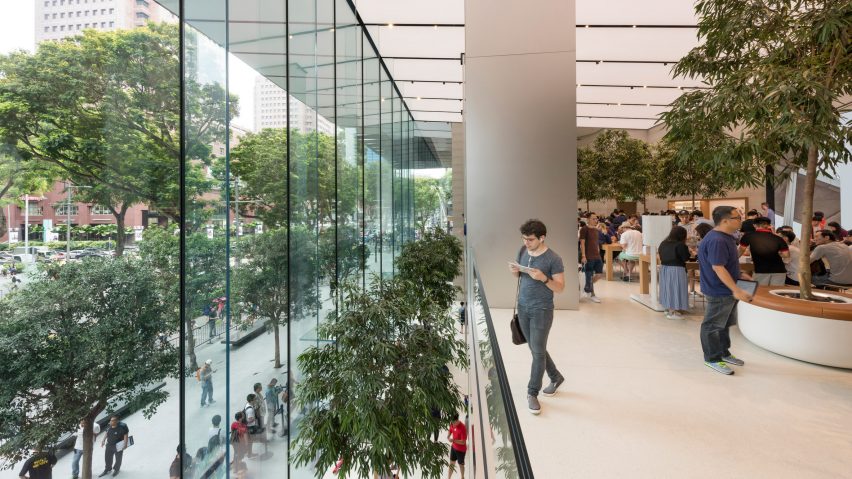Foster + Partners has built yet another tree-filled Apple Store, but this one also features hand-carved stone staircases.
Singapore's official ranking as the greenest city in Asia informed the design of Apple Orchard Road, the first Apple flagship in the city.
Like Foster + Partners' other recent Apple Stores, particularly the ones in London and Dubai, the building's most prominent feature is its trees. There are eight mature trees at the entrance and a further 12 ficus trees inside.
The building also integrates an array of sustainable technologies – meaning all of its energy comes from renewable sources.
"This is one of our greenest Apple spaces yet," said architect Stefan Behling, who is head of studio at Foster + Partners.
"It breaks down the boundaries between the inside and outside, with the greenery cascading through the store from the mezzanine to the ground floor and out onto Orchard Road, creating the most welcoming civic gesture."
In line with the now-familiar Apple Store aesthetic, the store features a minimal glass facade measuring 36.5 metres wide. This is sheltered beneath a slender cantilevered canopy, offering protection from Singapore's notorious tropical showers.
The eight mature trees stand in front of this facade, framing a public square at the entrance. The aim was to create a green orchard that pays tribute to the fruit and nutmeg trees that once occupied the area.
Inside, the two-storey space is framed by walls of Italian Castagna stone, which integrate the two hand-carved spiral staircases. The architects describe these as "warm and beautifully sculpted bookends" that offer "an homage to craftsmanship and materiality".
The ficus trees are located on both levels, planted in the same donut-shaped pots seen in previous stores, but the majority can be found up on the mezzanine.
Called the Genius Grove, rather than the Genius Bar, this space is the largest of its kind in any Apple Store worldwide. It is slightly set back from the facade behind a simple glass balustrade, creating a double-height atrium below.
The store's other features include Apple's widest video screen in the world, housed in a space called The Forum. The aim is for this to become a meeting place for the city's creative community.
Norman Foster's firm has established itself as the architect of choice for technology giant Apple.
Although the company wasn't involved in Apple's original store designs, it came up with the range of new interior features that were first showcased at the Apple Union Square store in San Francisco.
It is also behind the design of Apple Park, the brand's new ring-shaped headquarters in Cupertino, California.
Both Apple and Norman Foster ranked highly on the inaugural Dezeen Hot List – a countdown of last year's most newsworthy names in architecture and design. Apple did best, coming in at 11, but Foster was just behind at 13.
Photography is by Nigel Young/Foster + Partners.

